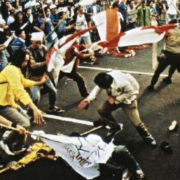
An attempt by Belok Kiri Fest organisers to hold a press conference was also eventually blocked by police. Photo by Belok Kiri Fest.
In circumstances that have become depressingly familiar in democratic Indonesia, organisers were forced to cancel the Belok Kiri Fest (Turn Left Festival) late last week, after permission to hold the event at the Taman Ismail Marzuki (TIM) cultural centre in Jakarta was withdrawn. The festival, which focuses on a critical reconstruction of history from a leftist perspective, was relocated, with significant cuts to the program, to the Jakarta Legal Aid Foundation (LBH).
According to Dolorosa Sinaga, chair of the organising committee, the festival used an artistic and cultural approach to challenge dominant discourses of Indonesian history. It included a series of discussions, a book launch, screening of a documentary about Buru Island (in which I was involved), and art workshops, led by Dolorosa and painter Yayak Yatmaka. Prominent Indonesian academics, artists and activists, including Asvi Warman Adam, Tisna Sanjaya, Nursyahbani Katjasungkana and Haris Azhar, were scheduled to speak on New Order propaganda, leftist movements in Indonesia, and social media.
Two government representatives also planned to give speeches: Hilmar Farid, director general for culture at the Ministry of Education and Culture, and Rizal Ramli, coordinating minister for maritime affairs. Ramli was to launch the book Sejarah Gerakan Kiri Indonesia untuk Pemula (The History of the Indonesian Left Movement for Beginners).
The Belok Kiri committee had been working on the festival since last year. But only a few days before the festival was due to start, on 27 February, TIM management informed them that the event could not proceed, as they had not obtained a permit from the Menteng Police. This is contrary to standard practice at TIM, where events do not usually require a police permit. Notifying the police is usually sufficient.
Indeed, the committee chose TIM because of its reputation as a centre for creativity and free expression. The venue is certainly not unaccustomed to holding politically sensitive events – the first screening of Joshua Oppenheimer’s acclaimed documentary The Look of Silence, was held there.
The committee tried to secure a police permit at the last minute but this was denied. The police cited opposition from mass organisations including the Indonesia Islamic Youth Movement (GPII), the Jakarta Activist Front (Froja), the Duta Legal Aid Institute (LBH Duta), Youth Lovers of the Motherland (Pemuda Cinta Tanah Air), and the Lombok Students Association of Jakarta (Himpunan Mahasiswa Lombok Jakarta). These groups claimed that the festival would promote “left wing ideology” in Indonesia.
An attempt by Belok Kiri to hold a press conference was also blocked by the police, who deployed 200 personnel to disperse the committee members and supporters. Meanwhile, a demonstration was staged by members of the mass organisations. They were given a permit to do so, with the police citing their right to freedom of expression.
Committee members rejected claims that the festival promoted communist ideology (which remains illegal under the Indonesian Criminal Code and Provisional People’s Consultative Assembly Decree No. 25 of 1966). Committee member Dhyta Caturani argued that the festival simply sought to encourage “an alternative way of thinking, one that is critical, emphasises humanity and is progressive.
“That is what we mean by ‘left’,” she said. “Why is there still so much fear when we want to discuss leftists and leftism. That is a part of our history, and we must be honest about it.”
Another of the festival’s organisers, Whisnu Yonar, pointed out that while the book on the history of the left movement did focus on the establishment of the Indonesian Communist Party (PKI) and the 1965-66 killings, the book also addressed Dutch colonialism and New Order propaganda.
The cancellation of the Belok Kiri Fest followed a similar pattern to the scrapping of 1965-related panels and events at the Ubud Writers and Readers Festival last year. It is part of a trend of growing restrictions on freedom of expression and repression of critical discourses on leftism and the events of 1965 and its aftermath. The room available for public debate is becoming increasingly narrow.
The cancellation also once again highlights the role of the police force, which appears unable or unwilling to stand up to pressure from mass organisations to the detriment of citizens’ rights to freedom of expression and assembly.
“The left” clearly still has the ability to engender deep fear among large sections of Indonesian society. In a superb opinion piece, Intan Paramaditha recently argued that Indonesians have long been trained to be suspicious of gerakan [movements]. Although her article focused on the LGBT debate, she pointed out that New Order indoctrination has caused many Indonesians to associate gerakan with unrest and political upheaval. She rightly argued that “the fear of gerakan is therefore the fear of the unknown”.
The Belok Kiri Fest sought to address – and ultimately deconstruct – that fear of the unknown by encouraging active participation and open dialogue. Nearly 20 years after the fall of Soeharto, unpacking and challenging New Order propaganda remains an uphill battle. But it is a struggle that those concerned with issues of human rights and history will not abandon.










